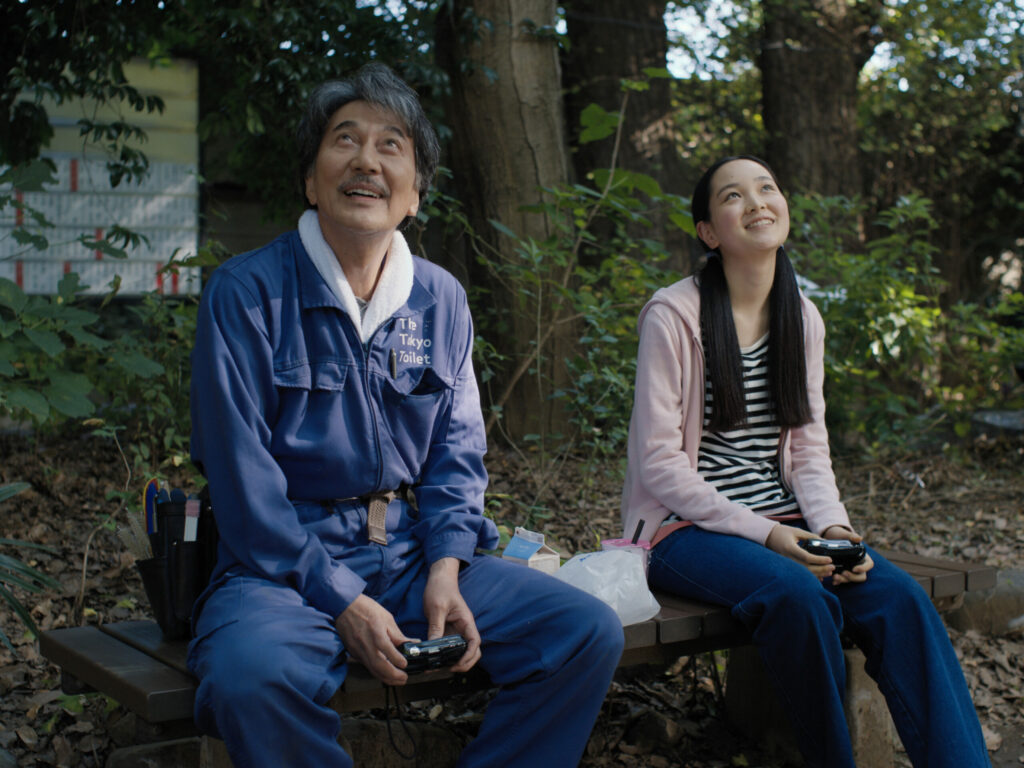Director Wim Wenders’ Perfect Days is a mirror for the modern human. Asking the question: in the age of social media, where everyone is supposedly connected, do we know how lonely the person next to us is?
By Bora Sezer
Perfect Days is a movie which was released in 2023, directed by Wim Wenders who is also the co-writer of the movie along with Takuma Takasaki. The movie became critically acclaimed as it earned an Oscar nomination in Best International Feature Film category. It won the Prize of the Ecumenical Jury and the lead actor Kōji Yakusho won the Best Actor at the Cannes Film Festival.
What are the Perfect Days?
The story is about Hirayama, a public toilet cleaner in Tokyo, and his encounters with certain individuals in his daily life. Hirayama is a lonely man of habit. He wakes up, makes up his bed, waters his flowers, puts on his uniform, and goes out the door with a smile on his face, looking up at the sky. He does no more and no less than what is necessary for him. The movie deals with the passage of time, change, and the fight against this change with a feeling of nostalgia, all seen through the lens of Hirayama’s camera.
The movie’s title is a bold and intriguing statement. How can days be perfect with so many variables? Wim Wenders indeed portrays days that are perfect for Hirayama. However, Hirayama’s perfect days are not the same as one would expect. Waking up early and doing a good job is enough to make Hirayama content with his days. There is no extravagant representation of life or flawless and uninterrupted happiness. Thus, Wenders challenges the modern world’s views on perfection. The attraction of Perfect Days comes from Hirayama’s unorthodox normality. In an age in which everybody feels ‘special’, Hirayama becomes special by being ordinary.
There are days when Hirayama works regularly without the outside world affecting his routine, there are days when his niece comes to his house and there are days after she has left. The first part of the movie builds Hirayama’s character as the orderly, respectful, quiet and helpful man he is. With the arrival of Niko, his niece, Hirayama’s habits are disrupted as he gives up his bed and includes Niko in his everyday life. However, his perfect days continue with the same determination even though there are times when he is sad and lonely, especially with the departure of Niko. She makes Hirayama realize that there are remnants of his old life which have slipped from his memory until her arrival. At that point, the audience is shown the full range of Hirayama’s emotions with a masterful performance by Kōji Yakusho. He cries, smiles, gets angry, and continues to live as that is all one can do.
Hirayama’s Habits and Happiness
The movie revolves around Hirayama’s habits, one of which is photography, allowing him to freeze time in a perfect moment according to the wielder of the camera. The feeling of nostalgia and the inevitable passage of time highlights Hirayama’s character, as he is portrayed as a lonely person. He fights with change and uncertainty by capturing a “constant” as a reminder of that moment.
Wenders chooses to show Hirayama’s entire preparation and journey to his work with various nostalgic songs such as »The House of the Rising Sun« by The Animals, »Dock of the Bay« by Otis Redding, »Feeling Good« by Nina Simone and more. Even though the songs are portrayed as if they are in the background, Hirayama listens to them, and they are abruptly interrupted by Hirayama’s arrival at work which makes the movie realistic. The modern world’s efficiency and Hirayama’s work ethic complement each other. Hirayama must stop the music that makes him happy and take on the real world, which he does with no complaint.
One of Hirayama’s habits is his love of taking photographs of sunlight leaking through the trees. This is called “Komorebi” in Japanese, which is translated as “sunlight leaking through trees”. The character’s habit of immortalizing a seemingly unimportant moment of life perfectly captures the message. The places no one looks at contain the perfection for Hirayama. That is also reflected in one of Hirayama’s habits: when he is cleaning the toilets, he carries a mirror with him to look under the toilets. Even though no one looks there, Hirayama must preserve the quality of his work. The reason behind this is Hirayama’s habitual character and work ethic. Hirayama may be a lonely man, but he sees more beauty in the world than most people.
Hirayama’s loneliness feeds on the past, reflected in the old music he listens to from his cassettes, which are now considered vintage items. The conventional and simple way he lives, even though his family has money, also proves that he chooses this life. Furthermore, Hirayama’s black-and-white photographs and scene transitions with Komorebi amplify the feeling of nostalgia, particularly when it is shown that Hirayama saves the photographs he takes, labeling the boxes with their dates. The transitions with Komorebi emphasizes the passage of time and nostalgia through their uniqueness, existing as moments in time that cannot be recreated. Thus, capturing each beautiful moment implies that nothing stays the same, even though Hirayama would like to keep it that way.
Billions of Lonely People
The theme of the passage of time is told through individuals who do not fit into the modern world’s idea of progress and perfection. Today, dreams are advertised to the individual through every possible medium possible, yet these dreams are not individualistic, but rather a mass production of the era. Wenders’ Perfect Days shows the reality of the era by giving screen time to lonely characters who struggle daily yet have no one to turn to. Aside from the main characters such as Niko and Takashi, the colleague of Hirayama, the side characters also contribute to and highlight Hirayama’s loneliness.

Perfect Days
2023
Director: Wim Wenders
Screenplay: Wim Wenders and Takuma Takasaki
Cast: Koji Yakusho, Tokio Emoto, Arisa Nakano
The lady in the park, the homeless man, the person who leaves the Tic-Tac-Toe game are some of the other examples of Wenders’ lonely people. Some yearn for the past, some want material things, and some just want to be understood. Despite the shared problems of myriads of characters, each is lost in some way and shares a commonality, loneliness. The audience watches Hirayama and his daily encounters, yet each character in the movie is going through the same problems in life. However, not everyone faces the world with the same gravitas and poise as Hirayama. His loneliness does not make him an outcast like the homeless man, or he is not as angry as Niko. He is a realistic example of how people act in society, even if they do not feel the same as they act.
The feeling of nostalgia causes people to get disheartened at the beginning of a new day, yet tomorrow is always scary when the comfort of the known takes over. There are millions, perhaps billions, of lonely people who must do what is necessary to survive. Enjoyment out of necessity is not common, and Hirayama is a realistic character for people who must endure the hardships of life. Even when things are not perfect, Wenders ends the movie with »Feeling Good« by Nina Simone as if to urge the audience to chase the perfect days just like Hirayama does.







Interesting that you mostly seem to focus on his loneliness. Loneliness is an important aspect of the film, but I was mostly happy, when I watched it. And sad during the family moments of the movie of course… But it struck me that the most important message of the film is: “Happiness has many faces, find your own.”
He is happy as a main character, as simple as his life might be and despite his poverty. That is what I love about it… that his life is happier than the lives of the rich and overworked people around him.